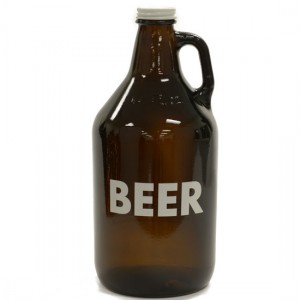
A Florida restaurant has filed a civil rights lawsuit in federal court claiming that the state’s ban on 64 oz. growlers is in violation of the U.S. Constitution.
According to Sunshine State News, the suit aims to end the ban on half-gallon growlers, which has been a highly controversial issue in the state; currently, 32 oz. and 128 oz. growlers are legal, but the industry standard 64 oz. option is prohibited.
Pacific Legal Foundation (PLF), a free-enterprise legal organization, filed the suit on behalf of the owners of The Crafted Keg.
“PLF always gets its man, so to speak,” Sanford R. Craig, a retired Orange County told the website. “The state is in for a fight on this one.”
Fortune Details the “Perils” of Crowdfunding Beer
Internet crowdfunding has become an increasingly prominent part of the brewing industry and, as evidenced by Stone Brewing’s recent success in raising $2.5 million on Indiegogo, is hardly a tactic only employed by small upstart companies.
In an article published late last week, Fortune details some of the “perils” facing brewers looking to take this route. For Stone, it was the vocal backlash — people were angry that a profitable company, the country’s 10th largest craft brewery, would turn to its fans to ask for cash. For others, the trouble seems to be moving on at all from a successful campaign. With money raised, “where to next?” presents itself as the important question in need of an answer.
While no clear answer is given, one successful fundraiser told Fortune the effort wasn’t worth the hassle. Mike Brenner, founder of Brenner Brewing, raised $26,000 on Kickstarter, in addition to $2.2 million in equity investments and bank loans.
“As far as the whole process goes, was it worth the money I got? Probably not,” he said.
He does offer some advice for would-be entrepreneurs looking to take this route, however, citing communication and transparency with backers as critical to the process.

It’s not too hard to draw parallels between beer and weed. Hops, for instance, come from the same Cannabaceae family of plants that produces cannabis. But the weed industry, now legal in Washington and Colorado, can learn more from beer than just basic biology, according to a recent article from Fast Coexist, written by Matt Bookbinder of Blindtiger Design. As Bookbinder writes:
What makes consumers pick a particular gram of cannabis versus the other dozen next to it? Packaging.
The best way to understand this is by looking at craft beer. There are countless IPAs on the shelf, but consumers gravitate to the selections that don’t look like someone brewed them in their basement.
What elements of good beer packaging for beer might cross over well to the bud business?
Our craft beer brands establish consistent systems that don’t make consumers subconsciously think about what they’re looking at–they just make sense. We also work to ensure that consumers can easily identify the type of beer they’re looking at with simple, intriguing, visual signals, so style-searching consumers can find ‘their beer’ within our brands. Similarly, cannabis branding should be visually pleasing. It should enhance–not detract–from the purchase experience, and help the consumer see themselves in their purchase.”
Eagle Rock Seeks to Renew License to Continue Operation
For the fourth time in five years, according to the LA Times, Eagle Rock Brewery must hold a public hearing regarding the renewal of a conditional use permit — without which, the brewery would be forced to cease operations.
From the Times:
“Applicants must conduct costly surveys of nearby businesses and residences, send informational mailings to those parties, and then petition the zoning administration in a public hearing. The application fee alone is thousands of dollars, and the process can take months.”
Eagle Rock was first granted the permit in 2008 and was under the impression it would be valid for 10 years, the article adds.
“It’s really frustrating because to this day, after being responsible business owners and doing everything that we can to better the community, we are still being villainized and still have to go in and plead our case,” Ting Su, Eagle Rock co-owner, told the website.
A spokesperson for councilman Mitch O’Farrell told the site the city is “exploring an idea” that would streamline the process.
